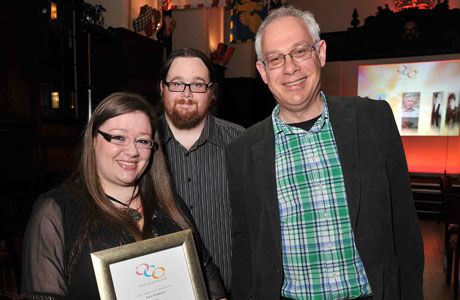
Leading from the front: Lucy Pankhurst
Although a natural modesty prevents her from admitting it, Lucy Pankhurst did the brass band world a service of inestimable proportions in winning a British Composer Award for her moving tribute to the tragic victims of the 1910 Pretoria pit disaster, ‘In Pitch Black’.
The fact she was present amongst the finest composers of the contemporary music world served to give brass bands a much needed profile boost.
However, that the work won the Brass and Wind category added something very special to her achievement.
‘In Pitch Black’ is the latest in a commanding catalogue of pieces that mark Lucy Pankhurst out as a composer of originality and creative diversity - encompassing a plethora of stylistic influences.
She is something of a compositional chameleon; traversing pop, funk and jazz in her lighter output, whilst retaining a sophisticated, complex creative nature in her searching, harder edged works.
4BR’s Chris Thomas chatted to Lucy about her busy creative life, staring with that awards night……
Chris Thomas: How does it feel to be the first female winner of a British Composer Award in the Brass/Wind category?
Lucy Pankhurst: Rather surreal! It never occurred to me that my piece would have a chance of winning – especially with two such strong works by very talented composers in the same category.
I was expecting to go along purely for an evening of cultural absorption, so events didn’t unfold as I had imagined!
I was completely overwhelmed that I managed to summon my voice back to accept the award from Michael Berkeley. I was petrified!
Winning was such an honour, but to be the first female composer in the category made it even more special.
Chris Thomas: It’s also the first time that a work for brass band has won. You must be delighted about that?
Lucy Pankhurst: I was very honoured by the judges’ comments about my piece. I think it’s fantastic that a contemporary brass work has been recognised in such a way and I feel humbled that it’s one I’ve written.
The reception ‘In Pitch Black’ has enjoyed since its premiere in November 2010 has been overwhelming. I was never sure how it was going to be received as it’s probably not what an audience would be expecting at a brass band concert.
It’s been so successful yet has still only had one live performance! It’s been completely unreal.
I’m still not certain that it’s fully sunk in just yet!
Chris Thomas: You were quite a late starter when you took up the tenor horn aged 13. How did it all begin?
Lucy Pankhurst: It was all a bit random. I’d quite fancied playing at school but the only brass instruments I knew were the trumpet and trombone. I opted for a trumpet because I assumed it would be quieter! Bless!
After weeks of mithering I was presented with a tenor horn and the phrase ‘it’s just like a big trumpet, but you cuddle it’. It must have been fate because when a trumpet became available I wasn’t interested!
Six months later I had passed my Grade Three and was playing in every ensemble in the school (including a saxophone group on horn!) I was also playing in a county wind band where I stayed until I went to the RNCM in 2000.
It wasn’t until I was about 17 that I joined Frodsham Silver and Cheshire Youth Bands.
Up until then I’d never actually heard a brass band as there weren’t any local ensembles. I took up the trombone in year 11, so I would quite often turn up to band and play whatever instrument they were short of that night!
I’d have a go at anything. It was great fun!
However, up until my first rehearsal with the RNCM Band, I’d never been part of a top section band before.
It was quite a baptism of fire, with players such as Owen Farr, David Thornton and John Doyle with James Gourlay conducting. It was a completely different world and I had to stand my ground as a player very quickly!
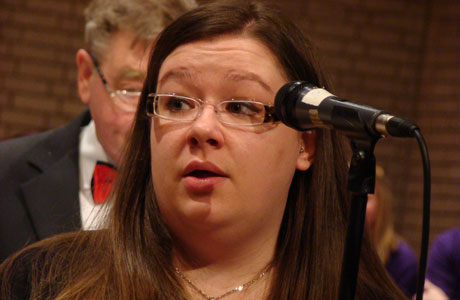
In adjudication mode at the 2011 National Youth Championships
Chris Thomas: When did you start to compose and what started you on the creative path?
Lucy Pankhurst: The first time was for my Music GCSE. Until then I was so focussed on playing that it never really dawned on me that I could write my own music.
I’ve always had an over-active imagination but I was quite shocked at the amount of musical ideas I had but never previously noticed. I felt an incredible sense of fulfilment and it was really exciting finishing my first piece and hearing it being played.
An early work was called ‘Terezin’, about a concentration camp which we had visited on an exchange trip to the Czech Republic. It was rather dark and it freaked my teachers out a bit.
After that, I used to write out my favourite songs or make little arrangements.
I’ve always enjoyed writing, it just never occurred to me that I was any good at it. It wasn’t until I got to college that things started to change. I took every composition or arranging elective that I could, purely because I enjoyed it so much.
Being in the college band opened my ears to a whole palette of sounds. Horovitz’s ‘The Dong With A Luminous Nose’ was a particular favourite. I loved the images it created; the shadows and the depth of it.
We also premiered Judith Bingham’s ‘The Stars Above; The Earth Below’, which set my imagination whirling with its undulating bass lines, whilst Gregson’s, ‘Trumpets of the Angels’ was a fantastic work to be involved with.
Perhaps the most stirring though were Birtwistle’s, ‘Salford Toccata’ and ‘Grimethorpe Aria’.
I had never heard anything like it before and was captivated. I wrote a lot of pieces for my friend’s recitals and must have begun to subconsciously draw on the new sounds I was hearing.
Both John Miller and Adam Gorb asked me if I would be interested in doing a Masters in composition.
I had composed a String Quartet and Adam said that he really enjoyed one bar..…just one bar in a 10 minute piece, but it was enough to make him think I might have some sort of aptitude for it!
So it has never really been a conscious decision to ‘become a composer’. Writing is just something I love to do..…and it just kind of happened!
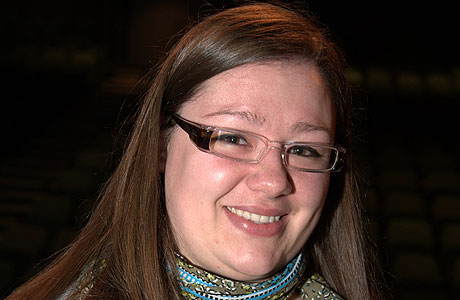
An intuitive smile from an intuitive composer
Chris Thomas: Could you tell us a little about your creative processes?
Lucy Pankhurst: Hmm…..this question is always a little tricky and, I fear, a bit disappointing when I answer!
Every piece is different for me as I don’t have a specific technique. I find I’m the same with most things in life. I’m not very linear or controlled in my approach.
Some days things work and other days are a complete creative waste - I very rarely have any control over it.
I don’t really have much compositional technique: I was always described as an ‘intuitive’ composer and still am for the most part, which is great on a good day but disastrous on a bad one!
If I have a strong idea or image in my mind I can write very quickly and these pieces are quite often the ones which I am happiest with. Without wishing to sound ridiculous, it can feel as though they already existed somewhere but I just happened to be the one to write them down.
However, when ideas are not flowing, it can feel like I’m trying to squeeze a dry sponge.
My brain just plonks a big black wall to block my imagination and I can’t access the bits I need to: It can be infuriating.
I very rarely start at ‘the beginning’ and finish at ‘the end’ of a piece. I have to write whatever is in my mind at the time.
If there’s nothing there, it’s usually quite unfulfilling to drag something out just for the sake of it.
I always try to have some manuscript with me in case I have an idea for something as I’ve noticed that as quickly as ideas spring into life they also dissolve back into silence.
I make a lot of notes or draw when I’m writing. Sometimes the mixture of mediums seems to help my brain communicate with itself…..but sometimes it’s purely procrastination!
Chris Thomas: A number of your pieces carry intriguing titles such as ‘Tiamat’, ‘Alchemists’ Fire’ and most recently ‘Petrichor’, which was premiered at the 2012 Festival of Brass.
Do they come before the music and how do you seek your inspiration?
Lucy Pankhurst: Every piece is different. I find that I work better with some kind of stimulus - a title, image or even a small fragment of music from which things can germinate.
When I start a work ‘cold’, completely abstract with only instrumentation and no title or creative concept, I find it almost impossible to write. I try to keep note of any ideas I have, even before I know what they’re for.
A few years ago my brother bought me a pendant with this cute little figure playing a flute. I decided to find out more and it turned out he was ‘Kokapelli’ – the Hopi God of music, fertility, dance and mischief.
Ever since, I’ve wanted to write a piece about him. Then, just before Christmas, I had the opportunity to write for the Tempest Flute Trio.
I mentioned my ideas for Kokapelli and they loved it. I had pages of little drawings that I sketched composing the piece and it was the fastest I’ve written in a while, purely because my brain was on overload!
Chris Thomas: The eclecticism of your musical taste is often reflected in your output.
What do you listen to for your own pleasure?
Lucy Pankhurst: I’m quite random in this sense too. I enjoy most music up to a point.
I can’t be bothered with general pop-pap and I can’t listen to the radio as the talking hurts my head and I object to having music thrust at me that in 9 cases out of 10, bores or infuriates me.
By choice, I like Mumford and Sons, ELO, The Divine Comedy, Bjork, The Raconteurs, Duke Special and Volcano Choir to name a few. I’m also looking forward to going to ‘Zappanale’, the Frank Zappa festival this summer.
I also enjoy interesting vocals, so unusual or distinctive singers tend to draw me in!
I have a very short attention span for music so I tend to either make myself compilation CDs or have my iPod on random, although I can get quite obsessive over things. I’ve been known to have a single track on repeat for a whole week and still not get tired of it.
My boyfriend Paul introduced me to Alarm Will Sound, which I absolutely love and tend to repeatedly fixate over.
My guilty pleasure though is Take That. I’ve been a fan since I was 11 and it’s an obsession I haven’t quite been able to shake off!
In the ‘classical’ sense, the same rules apply.
I’m fascinated by Birtwistle and Zappa’s orchestral works are brilliant; instantly recognisable and with so much depth to the texture. I’m gutted it took me so long to hear them.
I must admit though, occasionally I just like to sit and hear nothing: Absolute silence doesn’t occur very often living in a busy town, but it’s a welcome tonic when it does.
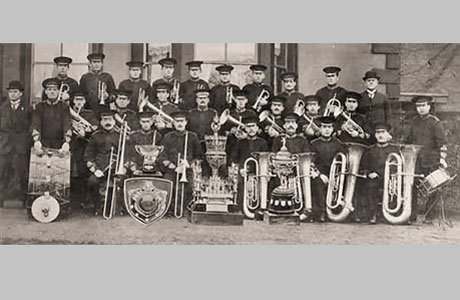
The great double winning Wingates Band in 1907
Chris Thomas: The recording of ‘In Pitch Black’ comes across as a deeply emotional response.
As a former Wingates player did you feel that connection in the writing and recording?
Lucy Pankhurst: Absolutely. The writing process was relatively quick as I had such a vivid plan of what I wanted to create.
I immersed myself in the history of the disaster and the band links for several months prior to writing a single note. It wasn’t until I had left the band that I began to compose the work.
I was determined that it wouldn’t be an Elegy. I wanted it to be dark and harsh in places, reflecting the devastation and anguish of a horrific event that destroyed the local community.
It seemed almost insincere to write a short, empathetically detached piece in memoriam.
I wanted to pay tribute to the lives lost and the devastation which remained in their absence by creating a work which begins in darkness; desolate and claustrophobic, whilst still leaving the audience feeling uplifted and thoughtful in the final bars.
I found the harsh reality of the shocking images and historical accounts disturbing and I’m not embarrassed to admit that it was a very emotional experience. I had to stop writing on several occasions.
The final section, where the hymn first sounds with only a few players and percussionists playing with ‘muffled drums’ (as the historical records state they did at the many funerals) was particularly difficult as this was where the music had to turn back to the light, which was not any easy task.
I can’t thank the band enough for allowing me to write the piece without prescription.
There aren’t many bands that would have trusted a young composer with such a task, especially with it being the focal point of a CD recording and high-profile memorial concerts.
I was asked back as a guest to play on the recording was so impressed with the way in which MD Dave Thornton had approached the work.
The band gave a stunningly sensitive performance. It was also the last recorded piece, which left me with an unusual mixture of emotions as I made my way home; sorrow, joy and humility.
Chris Thomas: The anguish and muffled moans at the opening of ‘In Pitch Black’ present a disturbing musical image.
That must have been difficult to write?
Lucy Pankhurst: It was - and it was particularly disturbing to hear in a rehearsal for the first time. It’s all very well when you hear the music in your head (or via Sibelius) but when the band breathed life into it for the first time it was breathtaking.
I was always concerned writing the opening. Would the images that I was trying to portray be evident and would people be offended or upset by them?
The subject matter is so disturbing, but by trying to illustrate a state of semi-conscious darkness amidst the aftermath of an explosion was not pleasant to create, nor was I convinced it was something people would want to hear.
However, I stood by my original intentions and tried to create an honest, heartfelt work. I hope I succeeded.
Chris Thomas: Your haunting piece ‘Midnight’ was written for the Leyland Band and euphonium soloist Philippe Schwartz.
Do you enjoy working collaboratively?
Lucy Pankhurst: Collaborations can be great as you know you are pretty much guaranteed a fantastic performance!
It can be a double-edged sword as other performances might be limited if you go too crazy - or not crazy enough though! That’s always a delicate balance.
However, with this piece I didn’t intend to tailor it specifically other than knowing I could pretty much write whatever I wanted to for the band and soloist.
They are such great players and have a cracking percussion section. The only stipulation I was given was for something ‘atmospheric’.
This is actually one piece that I started at the first bar and composed chronologically. Everything grew from the opening marimba ostinato.
Chris Thomas: You have also used electronics in your music, such as the delay system on the euphonium soloist in ‘Tiamat’.
Is that an area you would like to explore further?
Lucy Pankhurst: Definitely. I’m in the process of experimenting with different things in brass and electronics. Watch this space!
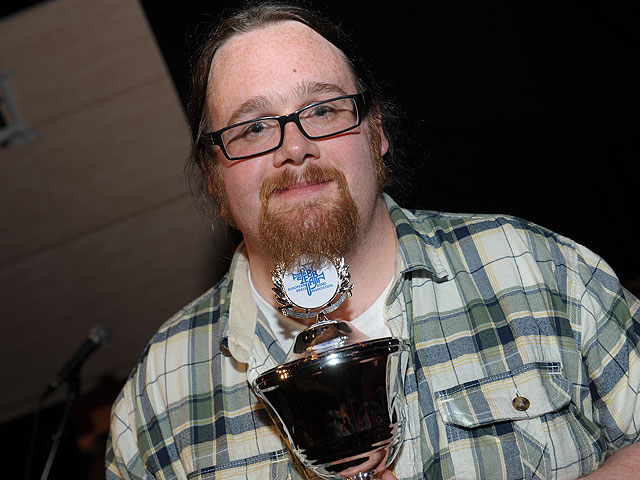
Creative partner - Composer Paul McGee
Chris Thomas: Your partner Paul McGhee is also a composer, so how does having two creative spirits in the house work?
Do you tend to bounce ideas and creative problems off one another?
Lucy Pankhurst: It’s fantastic! We regularly ask each other for feedback. When you’re working on a new piece it can be difficult to ‘hear’ it after a while.
You become so used to what you’ve done, it can almost desensitise you to where it needs to go.
Having a creative mind on tap can be a great kick-start to push past the elusive barriers that prevent you from hearing the next section, or figuring out why a particular bar doesn’t work.
We do have completely different composing processes and styles. I prefer to write a large section of music so I can see where I’m heading. Paul likes to get everything perfect before he moves on.
I can also write for hours usually to the point where I burn myself out and am completely exhausted, whereas Paul tends to pace himself, write for a while, then do something else for an hour before going back to it.
He’s got the better approach I think, as I can get quite narky when things don’t work!
But that’s just my process: Nothing else works for me. I often get a ‘noisy brain’ as if someone has left a radio on inside my head that I can’t turn off. It usually coincides with trying to finish a piece, or if I’m anxious about something.
It’s at times like that I tend to have to take a step back and leave things for a day or two.
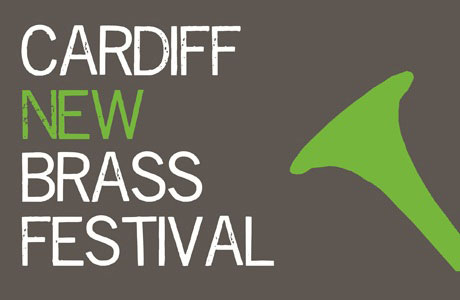
A rare new musical outlet
Chris Thomas: Do you see yourself writing an extended test piece given the opportunity?
Lucy Pankhurst: Hmm…..this is a tricky one.
I completely understand how important contests are - and that they are largely the reason why the ‘movement’ is still in existence and why elite bands are as technically skilled as they are.
Yet sadly for the most part, I personally find contesting a contrived and non-musical endeavour.
There is not one part of contesting that I can admit to enjoying. Occasionally I’ve felt an adrenaline rush on stage, but in all honesty I wanted to play music so I could quite literally play music.
I loathe how a piece is flogged for weeks on end with conductors obsessing and in some cases squeezing the life out of the music before contest day.
I’m generalising, but it’s my least favourite aspect of playing in a brass band. I’m not saying it’s wrong, I’m just saying how I personally feel about it.
I tend to find myself in the minority with my musical tastes in concerts and contests. The pieces I have enjoyed seem to have been the ones which the rest of the band has taken a dislike to.
This isn’t a conscious decision of mine, but it is something that does seem to be a recurring theme!
Because of this I have so far avoided writing a ‘test-piece’.
I’ve composed a number of experimental extended works but never specifically aimed as test-pieces. I would much rather focus my attention on contemporary music away from the contest stage.
The main platforms for this approach are at events such as the RNCM Festival or more recently, the Cardiff New Brass Festival (above).
I would love to see more bands beginning to include fresh pieces in their concert programmes.
After taking part in the composer’s forum at this year’s RNCM Festival it was evident that there is a huge amount of support from audiences who want to hear new music, but quite often bands are not concerned about programming something different.
I’m more interested in addressing this issue than contests.
One day I’ll probably have a go at writing a test-piece, but I doubt people will like it much.
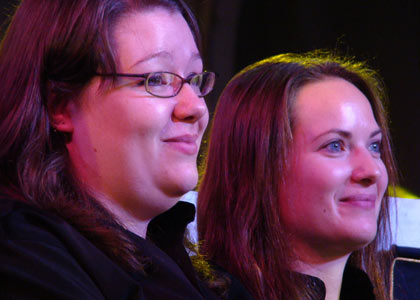
Lucy misses playing with Wingates
Chris Thomas: Who has been the greatest influence on you musically and creatively?
Lucy Pankhurst: Tricky! Do you know, I ask this question so often in my own interviews that I might not ask it any more as it’s so difficult!
As a performer I’ve been lucky in having several teachers who knew exactly how to make me into a better musician.
Janet Whittingham and Tony Whittingham at school were huge influences.
If it wasn’t for them, I wouldn’t have enjoyed my early years as a young musician and I seriously doubt I would have continued on the path that led me to where I am now. I actually still work with both Tony and Janet in my role as a HWDMS brass tutor!
Being a musician is all about confidence. If you aren’t confident you need to at least pretend to be.
Throughout my degree I struggled with this immensely, and it was only during my final year that something finally clicked and I could perform without anxiety attacks or stress-related migraines.
This change was largely due to Owen Farr, who was fantastically supportive and understanding, helping me to address the faults, whilst also focussing on my strengths.
He also encouraged me to write, which resulted in several pieces, including a ‘Horn Concerto’, which he premiered in 2005.
There have been so many other positive influences, but without these people, I certainly wouldn’t have even got over the first few hurdles – so thank you very much!
With composing, without doubt, Adam Gorb (my tutor at the RNCM) has had the greatest influence.
Never once during my Masters did he tell me what or how to write. He never tried to turn me into anything I wasn’t; he helped me on the road to finding my ‘voice’ and honed what little raw ability I had.
He was very patient and encouraged me to try write out of my comfort zone in my own way (which resulted in ‘Ascension’, one of the four winning pieces at the inaugural RNCM Festival of Brass Young Composers’ Competition in 2005.
I always felt like the token ‘comedy-student’ during my Masters. I hadn’t had any previous compositional ‘training’ and, let’s face it, I played in brass bands!
That was enough to make some people have a bit of a giggle, without even hearing any of my music.
Adam gave me belief in what I was writing and not to apologise for it.
Even being a composer, confidence is the key. If you don’t believe in your own work who the hell will?
I am also very lucky to have a Paul at hand. He has a far more realistic way of looking at things.
I have a tendency to over-complicate, so I’m sure that without his grounding influence I wouldn’t have completed half of the projects I have over the last two years.
Chris Thomas: How do you feel your more progressive music written and that of your contemporaries is received by the band world at large?
Do you find it demoralising that more music by the younger generation isn’t heard regularly on the contest stage?
Lucy Pankhurst: I’ve been incredibly fortunate with the reception of my more unusual works. I think that this is largely because I‘ve been lucky enough to have them played in the ‘right places’.
The majority of my larger works, such as ‘Alchemists’ Fire’, ‘Ascension’, ‘Petrichor’ and ‘Heed the Word’ all had their premieres at new music festivals. ‘In Pitch Black’ is actually the odd one out in this respect, but due to the way in which it has been presented, it has been well-received.
I’m not sure if it is a piece which people can actually ‘enjoy’, but at the premiere, it was preceded by my programme notes which explained what the work was intended to depict and the performance was also accompanied by projected images.
The audience were so moved that the band was inundated with comments and congratulations for weeks after. I’m not so sure that this would have been the case if it hadn’t been so well thought out and sympathetically delivered.
However, although they have received fantastic premieres, these have been the only live performances in most cases.
As I’ve said, the only place for contemporary brass pieces to be heard tends to be at festivals or contests. Currently, there is not another universally comfortable place for them to be programmed.
It’s a great shame that there are so few new voices being commissioned for contests.
However, in the last two years Gavin Higgins, Simon Dobson and Peter Meechan have been commissioned for own-choice contests outside the UK and Paul’s ‘Waiting For A Pain Hit!!?!??’ was used for the Championship Section at the 2010 Swiss Nationals. So it does show that there is a demand.
There is still a plethora of pieces though which have had a single airing such as Paul Patterson’s ‘Cataclysm’ and ‘Chromascope’ and ‘Prague’ by Judith Bingham.
Chris Thomas: Are these pieces ever going to be given a second chance?
Lucy Pankhurst: The brass band world is fickle.
I genuinely believe that there is an audience out there who are hungry for a new breed of test-piece. With a brass band such a fantastic vehicle to execute contemporary music, it seems a dreadful waste, especially in the UK.
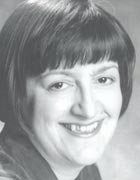 Chris Thomas: It's encouraging to see that there are more young female composers such Andrea Price and Emily Howard contributing to the repertoire and the likes of Tansy Davies, Anna Meredith and Rebecca Saunders making waves in the classical world.
Chris Thomas: It's encouraging to see that there are more young female composers such Andrea Price and Emily Howard contributing to the repertoire and the likes of Tansy Davies, Anna Meredith and Rebecca Saunders making waves in the classical world.
But why do you think that there are still so few high profile female composers?
Lucy Pankhurst: There was only a handful when I was at college. I've never fully understood why. I suppose it's similar to the question 'why are there so few female tuba players' (incidentally I know several who are all fabulous!)
Essentially it depends on where you've come from, the influences you've had and the choices you make. There aren't as many role models for aspiring female composers as there are male.....but shouldn't that make it an even more potent excuse to do it?!
For me, it was never a conscious decision to 'become a composer'…..it just sort of happened.
I've never liked conforming much…..it took me 6 years to read Harry Potter as I didn't want to like it just because everyone else did!
Some people seem to take an instant dislike music written by a woman. A classic example was Judith Bingham's (right) 'Prague'.
I’ve no doubt that the piece would have caused a bit of a stir as it doesn't comply with the traditional test-piece format. However, I also know that some individuals had no time for it purely because it was written by a woman.
I know this because I've met some of them.
The sad fact still remains that there are individuals who feel that way. Luckily though, good writing and superb music always shines through, despite petty grievances.
Everyone has their own specific things which draw them in or put them off. As a musician you just have to believe in what you do and trust your own judgement.
Musical preference is completely subjective, so you're never going to please everyone all of the time.
It's an amazing feeling when someone tells you they have enjoyed listening to or playing a piece you've written.
Composing is such a solitary existence and having a new piece played is like revealing a part of your soul.
Chris Thomas: You’ve not been playing horn regularly of late but presumably your playing days are not yet fully behind you?
Lucy Pankhurst: Hopefully not! It was a difficult decision to step down from Wingates but I was having to turn work down. Something had to give and sadly, for now, it has to be my playing.
The performing side of things had also begun to feel more unbalanced. I love playing concerts and playing new, fresh music, but as I mentioned, I was finding contesting increasingly tedious and that was beginning to impede upon my overall enjoyment of banding.
In retrospect it was probably the best time to take a step back before I reached the point of no return.
Being ‘bandless’ has given me more time to write, which has meant I can take on more projects as they appear. It has also allowed me to enjoy what playing I do and not take it for granted.
I miss playing a lot but I still ‘dep’ occasionally, which I always enjoy, and it never ceases to make me sulk for a few days that I don’t get to play more often! It’s something I hope I can go back to when I feel the time is right.
Chris Thomas: Finally, has your British Composer Award opened any new doors and what are your immediate plans for the future?
Lucy Pankhurst: Yes it has. I’m a bit short for time to get to deadlines at the moment actually...…I’d better get cracking!
My immediate plans are to finish two band projects and get stuck into a concerto for flute trio and string orchestra.
I also have the premiere of a piece for Wind Orchestra next month, ‘Ticket: 250654’, in memory of the eight musicians aboard the Titanic.
They all boarded with the same ticket number from which the piece gets its name and from which the musical material is generated.
I’m also hoping to have another wind band piece finished this year, have a few other projects planned with several other possibilities, plus I’m hoping to be in a position to take up my PhD place at the RNCM in September.
Hopefully I’ll be able to do more playing too, but for now I had better plough on with getting these projects finished!
Chris Thomas: Thanks for taking the time to talk to us and the best of luck for your forthcoming projects.













